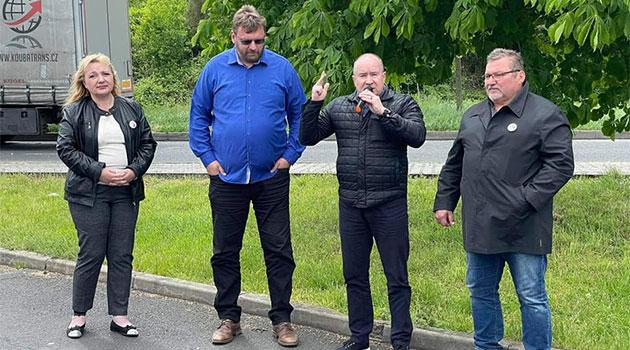Czech intelligence report on extremism mentions welfare chauvinist party as a populist, xenophobic entity once more, COVID-19 was the main focus of 2021

Populist/xenophobic activists and entities last year concentrated on what they alleged was the introduction of what they called “COVID totalitarianism”. That is the finding of the Czech Republic’s report on extremism for 2021, produced by the Interior Ministry, which was adopted by the Government last week.
As in previous years, the report mentions the “Freedom and Direct Democracy” (SPD) movement, which is seated in Parliament. This annual report found that the party took a chance on running a campaign in the elections last fall that was milder in tone compared to previous years.
The Interior Ministry warns that extremist, xenophobic groups are able to intentionally create divisions in society and disrupt the Czech Republic’s pro-western ties. “The Russian invasion of Ukraine represents a significant warning to Czech society. The Czech Republic’s democratic viability essentially relies on eliminating extremist and xenophobic groups,” the report says.
During 2021, the Czech Police detected 108 crimes with a hateful subtext. Police also recorded a total of 99 persons prosecuted for crimes committed with a hateful subtext.
A total of 72 persons were indicted for felonies motivated by hatred of nationality, race, or some other grounds. A total of 67 persons were convicted.
Battling against the measures to suppress the pandemic
The entire spectrum of extremist entities, according to the report, significantly dedicated their efforts last year to the COVID-19 pandemic and the Government measures undertaken to suppress it. Entities describing their orientation as “patriotic” criticized the measures, frequently joined protests against different limitations, or got involved in the activities of movements fighting against vaccination, the report states.
According to the Interior Ministry, the degree of aggressivity grew among some opponents of the measures to suppress COVID-19, and they focused anew during 2021 on doctors and paramedics in addition to politicians. “COVID-19, as a subject, overshadowed the invective that is traditionally xenophobic and aimed at minorities, migrants, or other groups,” the report adds.
Criticism against the measures to suppress COVID-19, according to the Interior Ministry, was generally shared by entities describing themselves as oriented “pro-nationally”, but did not lead to their unification. “This is documented by, among other matters, the broad range of entities with programs similar to each other who fielded candidates during the parliamentary elections in October,” the report states.
Compared to previous years, the SPD took a chance on running a milder campaign, according to the report. The Volný blok (“The Free Bloc”) of former Czech MP Lubomír Volný relied on activities that were more controversial, according to the Interior Ministry.
The marginal significance of the Workers’ Social Justice Party (DSSS)
Criticisms of the measures to suppress the pandemic were also the focus of the Workers’ Social Justice Party (Dělnická strana sociální spravedlnosti – DSSS) and the National Democracy party. Both entities are categorized by the Interior Ministry as far-right extremists.
The DSSS, in the past, was one of the main forces attempting to spark anti-Roma attitudes and unrest in the Czech Republic. Ahead of the autumn elections they supported “The Free Bloc” and later their representatives became part of the antivax protests under the auspices of the Chcípl PES (“The Dog Has Died”) group, where PES is an acronym for the Government’s online reporting system about the state of the pandemic.
Both of these parties and their organizations for youth are entities of a marginal nature, according to the report. They are unable to attract attention on their own and therefore do their best to join other, more progressive groups.
According to the Interior Ministry, extremist groups on the right moved their self-presentation onto social media in 2021. They also continued to stay in touch with their counterparts abroad.
Such contacts, however, were minimal and happened at an individual level, primarily. “The representatives of far-right extremist entities are aware of the risks of criminal prosecution and are more cautious in their public speeches. For example, obvious references to the Nazi Third Reich are something such persons do their best to avoid,” the Interior Ministry reports.
Movements of neo-Nazis were created last year by activists or groups who are isolated, relatively, and who have not appeared much in public. Activists who are neo-Nazis communicate among themselves online and have created their own communities there.
Groups of militias or paramilitaries
The Czech environment for militias does not create a compact, single whole, but is a conglomerate of a few groups that are heterogeneous and just loosely connected with each other. Many of them develop their activities in the real world just sporadically and without any coordination with others, to a great extent.
The activities by militias that pose the most risk are their attempts to illegally manufacture explosives and firearms. There is no doubt that an event of importance during 2021 that was associated with such groups was the indictment of five persons from the “Czechoslovak Soldiers in Reserve for Peace” (Českoslovenští vojáci v záloze za mír, z.s.) on more than one count of the crime of terrorism related to the conflict in eastern Ukraine.
Attacks that are hate-motivated and perpetrated through the Internet
The authorities continued to record online hate speech last year. Frequently it is incited by various articles or remarks made by politicians who are xenophobic.
There was a broad palette of bias crimes committed with a hateful motivation and, as in previous years, the criminal justice authorities investigated them during 2021 as well. One phenomenon with a rising tendency was that of e-mails making threats and of hate speech on the Internet against the Government and the media due to disagreement with the instituted measures during the fight against the COVID-19 pandemic.
“During 2021, the situation was unaltered with regard to assaults of a physical nature or threats between the ‘majority’ ethnicity and Romani people, which were committed with approximately the same frequency by members of both the majority and the minority. According to information from the prosecutor, no attacks motivated by race and resulting in fatalities happened during 2021,” the report states.
Disinformation media outlets and dissemination of hateful prejudices through the media
Media outlets that spread hateful prejudices, however, continued to function during 2021 in symbiosis with those activists and politicians who are xenophobic, the Interior Ministry reports. “The disinformation media outlets dedicated themselves to the priority of sharing allegations about COVID-19 that were unsubstantiated, or rather, allegations about the measures to suppress the pandemic,” the report states.
“Such outputs became a resource that was welcomed by activists or politicians who are xenophobic. Different conspiracy theories frequently appeared about the COVID-19 disease not existing, or about its dangers being exaggerated,” finds the report.
“According to these theories, the aim of the measures to suppress the pandemic was to rule society or constrain individual rights,” the Interior Ministry report states. Several disinformation media outlets continued to produce antisemitic conspiracy theories last year as well.
Antigypsyist or anti-LGBT+ outputs appeared rather fitfully and to a lesser extent in 2021. Pro-Kremlin propaganda was regularly spread by these media outlets, especially in cases of disputes between Russia and the West.
Media outputs conceived along these lines were produced with increased intensity in association with the scandal of the fatal explosions in Vrbětice. After the outcry over that scandal had “died down” in the public space, anti-immigrant and anti-Muslim subject matter began to be “dusted off” and disseminated much more frequently by these media outlets in association with the relaxation of the measures to suppress the pandemic.
Extremists on the left
Anarchists, communists who are orthodox, and extremists on the left did not manage to capture any attention in public life last year; the Interior Ministry reports that this is an aging, closed community recycling claims from the pre-1989 days that are dogmatic in nature. “With the exception of a few individuals, no interest is shown in their organizations for young people by any youth,” the report says.
According to the Interior Ministry, the community of communists who are orthodox assesses the current regime in Russia quite uncritically and regularly follows and shares pro-Kremlin propaganda. The report says that last year’s failure by the Communist Party of Bohemia and Moravia (KSČM) to be elected to the lower house at all was attributed to the party representatives in particular by this community.
